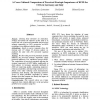Free Online Productivity Tools
i2Speak
i2Symbol
i2OCR
iTex2Img
iWeb2Print
iWeb2Shot
i2Type
iPdf2Split
iPdf2Merge
i2Bopomofo
i2Arabic
i2Style
i2Image
i2PDF
iLatex2Rtf
Sci2ools
125
click to vote
HICSS
2008
IEEE
2008
IEEE
A Cross-Cultural Comparison of Perceived Strategic Importance of RFID for CIOs in Germany and Italy
Purpose: Drawing from literature on innovation, strategy and culture the objective of this study is to explore the role of perceived potentials and perceived strategic importance on CIOs’ perspective on RFID technology in two different cultural settings. Methodology: Based on survey responses from 463 German and 157 Italian IT decision makers we analyzed the data with PLS structural equation modeling. Findings: We show that perceived potentials of RFID influence the perceived strategic importance which positively influences CIOs’ intention to invest in RFID. The composition of perceived potentials affecting the strategic importance of RFID differs significantly in both cultures. In Germany, potentials attributed to RFID are improving quality, automating manpower, reducing counterfeits, and improving customer-service. Italian CIOs value reducing stock inconsistencies, optimizing stock keeping, and improving customerservice as RFID potentials. Regardless of culture, findings show th...
| Added | 29 May 2010 |
| Updated | 29 May 2010 |
| Type | Conference |
| Year | 2008 |
| Where | HICSS |
| Authors | Stefanie Jahner, Jan Marco Leimeister, Uta Franziska Knebel, Helmut Krcmar |
Comments (0)

